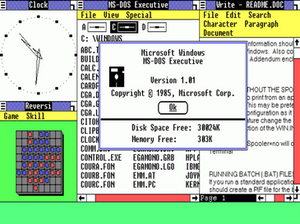Windows 1.0
| A version of the Microsoft Windows operating system | |

Screenshot of Microsoft Windows 1.01
|
|
| Developer | Microsoft |
|---|---|
| Source model | Closed source |
| Released to manufacturing |
November 20, 1985 |
| Latest release | 1.04 / April 1987 |
| License | Commercial software |
| Preceded by | MS-DOS (1981) |
| Succeeded by | Windows 2.0 (1987) |
| Support status | |
| Unsupported as of December 31, 2001 | |
Windows 1.0 is a graphical personal computer operating environment developed by Microsoft. Microsoft had worked with Apple Computer to develop applications for Apple's January 1984 original Macintosh, the first mass-produced personal computer with a graphical user interface (GUI) that enabled users to see user friendly icons on screen. Windows 1.0 was released on November 20, 1985, as the first version of the Microsoft Windows line. It runs as a graphical, 16-bit multi-tasking shell on top of an existing MS-DOS installation. It provides an environment which can run graphical programs designed for Windows, as well as existing MS-DOS software. Its development was spearheaded by the company founder Bill Gates after he saw a demonstration of a similar software suite known as Visi On at COMDEX.
Despite positive responses to its early presentations and support from a number of hardware and software makers, Windows 1.0 was received poorly by critics. Critics felt Windows 1.0 did not meet their expectations. In particular, they felt that Windows 1.0 put too much emphasis on mouse input at a time when mouse use was not yet widespread; not providing enough resources for new users; and for performance issues, especially on systems with lower computer hardware specifications. Despite these criticisms, Windows 1.0 was an important milestone for Microsoft, as it introduced the Microsoft Windows line, and in computer history in general. Windows 1.0 was declared obsolete and Microsoft stopped providing support and updates for the system on December 31, 2001.
...
Wikipedia
